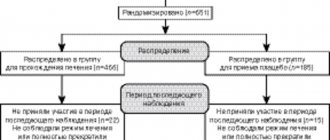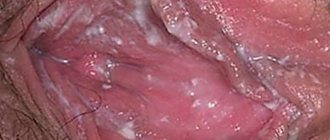Inflammation of the vaginal mucosa is accompanied by profuse leucorrhoea with an unpleasant odor, itching and burning in the external genital area, and pain in the lower abdomen. Colpitis (vaginitis) is an inflammatory disease, one of the most common reasons for women to visit a gynecologist. Pathology can occur at any age and significantly reduce the patient’s quality of life. Colpitis develops on the vaginal mucosa, but as the inflammatory process spreads, it can affect the vulva, uterus, appendages, and lead to irreversible changes in tissues.
At an early stage, colpitis responds well to treatment. Women are advised not to delay visiting a doctor and make an appointment with a gynecologist at the Alfa Health Center clinic in Moscow when the first symptoms appear.
Etiology of colpitis
Normal vaginal microflora includes dozens of types of microorganisms that can live and reproduce in this environment without causing disease. This is a flexible biocenosis that can quickly adapt to changes and suppress the excessive development of opportunistic microbes - such processes are called colonization resistance.
Under the influence of various external and internal factors, the balance of vaginal microflora can be disrupted. The number of lactobacilli decreases, which, in turn, leads to a change in the acidity of the environment and creates favorable conditions for the development of pathogens. Inflammation occurs.
The main infectious agent may be staphylococcus, Escherichia coli, streptococcus, fusobacteria, non-spore-forming anaerobes, peptostreptococci or other bacteria. But in recent years, vaginitis has been characterized by a mixed etiology, when inflammation is caused by the activity of several types of microbes. This significantly complicates treatment, increases the risk of relapse of the disease, and contributes to the transition of acute colpitis to chronic.
Symptoms
Acute colpitis
This disease is characterized by the sudden appearance of a number of symptoms:
- itching;
- pain in the vagina;
- burning;
- copious discharge;
- pain and discomfort during urination;
- feeling of heaviness in the lower abdomen.
During the examination, swelling and redness of the vaginal mucosa is revealed. When inflamed, it becomes hypersensitive and may bleed in response to the insertion of speculum. Sometimes the cervix and other organs of the female genital area are involved in the process.
The nature of the discharge in acute colpitis depends on the causative agent of the infection. If it is Trichomonas, then the discharge becomes yellowish-green with a pronounced unpleasant odor; if Candida fungus is white, curdled.
Chronic colpitis
Occurs as a result of untreated acute colpitis. The pathological process enters a latent stage with periodic exacerbations. In chronic colpitis, the inflammatory process can also spread to all female genital organs (cervix, uterus, fallopian tubes and ovaries).
Provoking factors
Even the presence of pathogens in the vagina does not necessarily lead to colpitis. For an infection to cause inflammation, provoking factors must be present that suppress the activity of lactobacilli and reduce the local immunity of the female body.
The most common causes of colpitis are:
- violation of the rules of intimate hygiene: too frequent or insufficient washing, use of inappropriate products;
- indolent sexually transmitted infections;
- early sexual debut and promiscuity;
- mechanical injuries to the vaginal mucosa, for example, when using intimate toys, after an abortion, surgery;
- wearing tight underwear made of synthetic fabrics;
- endocrine diseases: diabetes, obesity, thyroid dysfunction;
- hormonal imbalance during puberty, pregnancy, menopause;
- allergic reactions;
- chronic stress, depression;
- lack of vitamins, poor nutrition;
- radiation and chemotherapy for cancer;
- immunodeficiency;
- self-administration of hormonal drugs, antibiotics and a number of other medications;
- congenital pathologies of the structure of the internal genital organs;
- installation of an intrauterine device, etc.
In clinical practice, cases have been described in which women complained of symptoms of colpitis after returning from an exotic country. The reason is a change in diet. A woman actively tries local cuisine, and the microflora reacts by shifting the balance. In such cases, colpitis is often accompanied by intestinal dysbiosis.
Atrophic forms of vaginitis occur in postmenopausal women. The cause of inflammation is the natural thinning of the vaginal mucosa. Dryness in the intimate area contributes to imbalance of microflora.
The doctor tries to determine the cause of vaginitis as accurately as possible in each specific case. Treatment tactics depend on this.
Causes of discomfort in intimate places in women
Unpleasant sensations in the vagina before the onset of menstruation may be associated with low estrogen levels, which usually decrease in the second half of the cycle. With the arrival of menstruation, the discomfort in the vagina usually stops. However, due to irregular replacement of the pad and rare washings, itching, burning, unpleasant odor, etc. may also appear. The pad should be changed every 3-4 hours and immediately after finishing sports. On such days, it is necessary to visit the bathroom more often, since blood discharge is a favorable environment for the development of pathogenic microbes.
If a woman, in addition to discomfort in the intimate area, often experiences thirst, weakness and frequently goes to the toilet, this may indicate the initial stages of the development of a more serious disease, including diabetes. In this case, you need to contact a specialist who will prescribe a series of tests, including a test for glucose levels. You should also contact a specialist in this profile if, in addition to unpleasant sensations in the groin, there are menstrual irregularities, pain in the lower abdomen, increased nervousness and sleep disturbances. These symptoms may indicate an imbalance of sex hormones.
Hormonal levels are also subject to changes during pregnancy. When carrying a baby, the vaginal mucosa changes; it becomes looser, more porous and susceptible to minor external influences: allergies to hygiene products, abrasions from underwear or irritation from panty liners may occur more often.
In addition to all of the above, not only pregnant women, but also women who have just given birth normally have reduced local immunity, so they are more susceptible to infections: chlamydia, herpes, thrush, and more. Being in an interesting situation, it is strongly recommended not to self-medicate at home, but to entrust your health to a competent specialist.
Discomfort in the intimate area can also occur in women over 40 years of age. This is due to hormonal changes in the body - the production of the hormone estrogen decreases. Due to the smaller amount of estrogens, which are involved in the production of vaginal secretions, in most cases women experience dryness and pain in the intimate area. Often itching and burning are accompanied by severe scratching in the perineum, and these are suitable conditions for the development of various infections.
By the way, discomfort in the vagina does not always indicate some serious illness. First of all, you need to pay attention to external factors: the composition of intimate hygiene gel or underwear material, whether hair removal of the groin area was performed correctly. All this can cause irritation and, as a result, discomfort, itching and burning. Also, tight synthetic underwear, pads of questionable quality, or an incorrectly inserted tampon can lead to damage to the mucous membrane.
Expert opinion
The diagnosis of colpitis “gets younger” every year. The reason is not only the early onset of sexual activity in girls, but also the modern fashion for underwear. A patient comes to see a doctor with characteristic complaints, and we immediately pay attention to her clothing. Beautiful, lacy synthetic underwear, fashionable thongs do not allow air to pass through and cause a local increase in temperature. This is an ideal environment for bacteria to multiply. If constant wearing of such underwear is accompanied by insufficient intimate hygiene, the girl is almost guaranteed to get bacterial colpitis. You can wear thongs and lace, but only for a short time and on special occasions. The rest of the time, you should take care of your health and choose cotton underwear that will not rub the perineum and will not cause overheating.
Description
Vaginal burning is a subjective symptom that is characterized by the occurrence of unpleasant, uncomfortable sensations in the vaginal area. It is also worth saying that very often itching in the vagina can actually be caused by a different localization of the pathological process, in the area of the external genitalia, but the woman will complain specifically about a burning sensation in the vaginal area. Therefore, the reasons that lead to these complaints should be considered together. Sometimes a burning sensation in the vagina is combined with skin itching in the perineal area and discomfort in the area of the vestibule of the vagina. Almost always, this symptom is accompanied by the appearance of pathological discharge.
Symptoms of colpitis
In the first stages of inflammation, the clinical picture may be blurred. Women notice signs of colpitis when the process already reaches the vulva and vulvovaginitis forms with more pronounced symptoms:
- The character of the leucorrhoea changes
. Discharge from colpitis darkens and smells unpleasant. Purulent, bloody impurities and clots may appear. The discharge takes on a foamy, cheesy, watery character, which differs significantly from the usual consistency; - Itching and burning appears in the perineum
. When inflammation spreads to the vulva and external genitalia, swelling and redness occur. Itching and burning are some of the characteristic signs of colpitis, which do not subside even at night and cannot be controlled with medication; - Periodic pain occurs in the lower abdomen
. Women experience similar sensations before menstruation. With colpitis, the pain intensifies during sexual intercourse and bowel movements; - Problems with urination appear
. Inflammation in the genitals contributes to the development of an ascending urinary tract infection. The clinical symptoms of colpitis include frequent urination, urinary incontinence, and pain when trying to empty the bladder. Body temperature rises.
Nature of itching in the genital area
By nature, scratching in the female genital area can be constant, periodic and occur only under certain conditions - for example, after a hot bath, beach, sexual intercourse. It is necessary to consult a specialist even in case of periodic and seemingly minor itching, because such a symptom may indicate health problems and the need for therapy. If you start to itch “there”, do not hesitate, consult a doctor.
Itching in the vagina and burning after urination
Most often, the appearance of this symptom after visiting the toilet may indicate the presence of cystitis - inflammation of the mucous membrane of the bladder. This disease is manifested by a frequent urge to urinate, which is an irritating factor and creates the feeling that the inflammatory process is concentrated in the genital area.
Urethritis, an inflammation of the walls of the urethra, which is affected by various types of bacteria and viruses, also leads to discomfort in the genital area.
Almost any disease of the excretory system that causes dryness of the mucous membrane, leads to microtrauma and is accompanied by the appearance of discharge, can cause a woman to complain of discomfort. Urine entering the area of microtrauma causes irritation, resulting in discomfort.
Redness of the vagina in diabetes mellitus
Diabetes mellitus leads to changes in the functioning of the entire body. With this disease, damage to small vessels is observed, local immune forces decrease, the acid-base balance changes, the skin and mucous membranes become dry, flaky, microcracks easily appear on them, which become infected with pathogenic flora and fungi, which leads to inflammatory diseases. And of course, a woman may be bothered by discomfort in the genital area, which is manifested by itching and pain.
Unpleasant allergy symptoms
An allergic reaction can occur when the body is exposed to multiple irritants, such as medications and certain foods. Excessive use of intimate hygiene products - all kinds of scented gels, foams, panty liners - can also lead to allergies and itching in the genital area.
Wearing synthetic, excessively tight underwear, as well as regular shaving of the intimate area with subsequent hair growth can also cause itching.
Itching and burning in the vagina after intercourse
Women often experience unpleasant symptoms when they are allergic to lubricants and the latex from which condoms are made. Various spermicides can also cause irritation and itching in the genital area. If you have an allergic reaction to your partner's seminal fluid, unpleasant symptoms appear after unprotected intercourse and are accompanied by redness and swelling of the vagina and external genitalia.
Sometimes the cause of an allergy to a partner's sperm lies in his food preferences or in the medications he takes. Therefore, if there is discomfort after sexual intercourse, in many cases it is necessary to treat the couple together and contact a gynecologist and urologist.
Discomfort due to improper hygiene
Both insufficient and excessive hygiene are harmful when a woman violates the natural flora of the genital organs. Not everyone knows that regular soap is not suitable for the intimate area, because it changes the environment in favor of an alkaline one. This can additionally lead to discomfort and itching. The skin of the body and the mucous membrane of the genitals have different pH values, so in order to avoid itching anywhere, they need different care.
Problems when taking antibiotics
Antibacterial drugs are often used in the treatment of various bacterial infections. As a rule, the course of treatment with these drugs prescribed by a doctor is quite long. And this does not count the cases when women self-medicate and prescribe antibiotics to themselves, for example, for ARVI and influenza. They don’t know that antibacterial drugs are powerless against viruses and can only cause harm.i
Unfortunately, as a result of taking antibiotics, the beneficial microflora of a woman’s body suffers, which causes problems with the gastrointestinal tract and other internal organs. Bacterial vaginosis may develop - vaginal dysbiosis, in which the number of beneficial bacteria sharply decreases, while the opportunistic flora grows and makes itself felt by itching in the genital area.
Dysbacteriosis also often leads to a decrease in the local defenses of the mucous membrane, which only aggravates the process and leads to secondary infection.
Discomfort with candidiasis (thrush)
Urogenital candidiasis is caused by yeast-like fungi of the genus Candida, which, in the absence of any disturbances in the body, are normally present in the microflora of the genital organs. Candidiasis develops with intensive proliferation of fungi, which leads to a disruption of the natural balance of the environment of the genital organs. The development of candidiasis is often caused by a general decrease in immunity.
The fungal disease is manifested by swelling, hyperemia (redness), copious cheesy discharge from the genital tract (which is why this disease is popularly called thrush), pain during sexual intercourse and a feeling of irritation and itching in the vulva area.
Contrary to popular belief, men also suffer from candidiasis, which manifests itself in them as a disease such as balanitis, an inflammatory disease of the penis.
Vaginal discomfort during pregnancy
Discomfort in the genital area in a pregnant woman is caused by the same reasons as in women who are not currently expecting a child. But still, the expectant mother has one more reason for discomfort in the genital area - sudden changes in hormonal levels in the body. Hormonal imbalance leads to a weakening of the immune system, which in turn contributes to the proliferation of pathogenic bacteria in the genital area and the appearance of an unpleasant symptom.
Treatment and relief from vaginal discomfort during pregnancy must be treated with the greatest care and only those drugs whose instructions indicate that they are approved for use by expectant mothers should be used.
Itching and burning in the vagina during menopause
With the onset of menopause, a woman’s hormonal levels also undergo enormous changes that affect all organs and systems, including the reproductive organs. Estrogen deficiency in the female body, as well as involutive changes in blood circulation, a reduction in the secretory activity of the gonads and the production of collagen fibers, which are responsible for rapid tissue regeneration, all lead to discomfort in the genital area. A woman is worried about dry mucous membranes, discomfort during sexual intercourse, and often microtrauma and the appearance of wounds.
If you detect the first signs of atrophic changes, you should contact a gynecologist to prescribe adequate treatment that will eliminate unpleasant symptoms and allow you to have a sexual life without unpleasant consequences.
Discomfort in the genital area due to sexually transmitted diseases (STDs)
Sexual infections are one of the most common causes that lead to unpleasant symptoms in the vaginal area. Almost all infectious diseases that are sexually transmitted lead to discomfort in the genital area.ii
The following urogenital infections most often manifest as itching in the genital area:
- chlamydia;
- trichomoniasis;
- mycoplasmosis;
- ureaplasmosis;
- syphilis;
- gonorrhea.
All of these diseases are distinguished by nonspecific symptoms, one of which is scratching in the intimate area.iii To prevent partners from itching, it is necessary to consult a doctor in a timely manner and begin treatment when the first suspicious signs appear.
Types of colpitis
According to the intensity of the disease, the disease is divided into two types:
- Acute colpitis
. Symptoms are pronounced, appear and increase within 1-3 days. In the acute period, treatment is most effective if you consult an experienced gynecologist; - Chronic colpitis
. The disease occurs with mild symptoms. Periods of exacerbation occur in waves, the frequency and intensity of manifestations are individual.
According to the type of pathogen, there are two types of vaginitis:
- Specific colpitis
. The inflammation is caused by a sexually transmitted infection acquired from a partner. The disease is quite aggressive, with pronounced symptoms, and can occur even with normal vaginal microflora. Specific ones include chlamydial, trichomonas vaginitis, inflammation caused by gonococcus, Koch's bacillus; - Nonspecific colpitis
. The causative agent is a microorganism that is present in the natural microflora of the vagina: Candida fungi, E. coli, streptococcus, ureaplasma, mycoplasma, etc. The cause of the disease is a shift in the balance and inhibition of lactobacilli. Nonspecific includes, for example, fungal (candidal) colpitis, which is usually called thrush.
Causes
There are many reasons for burning in the vagina:
1. Colpitis and vulvovaginitis of various etiologies, including infectious processes caused by STIs.
2. Bacterial vaginosis.
3. Genital herpes.
4. Various diseases of the cervix.
5. In a number of situations – pathology of the pelvic organs (cysts, inflammation, endometriosis).
6. Genital condylomas of the vaginal and vulvar mucosa.
7. Tumor processes of the vagina, cervix and vulva.
8. Various genital fistulas (urinary, intestinal, etc.).
9. Various types of urinary incontinence.
10. Dystrophic changes in the mucous membrane of the vagina and vulva.
11. Prolapse of the uterus and vagina.
12. Senial atrophy of the vaginal and vulvar mucosa in elderly women.
13. Post-radiation changes in the vaginal mucosa.
14. Presence of a displaced IUD.
15. Frequent douching and use of antiseptic drugs.
In addition, vaginal itching can be caused by other conditions and diseases not related to pathology of the vagina and pelvic organs. This is observed when:
1. Hemorrhoids.
2. Various diseases of the rectum (proctitis, anal fissure, tumors).
3. Frequent constipation.
4. Irritable bowel syndrome.
5. Acute and chronic cystitis, bladder stones, bladder diverticula.
Separately, it is worth mentioning about human parasitic diseases, in which there is a burning sensation in the vagina. These are scabies, lice pubis, helminthic infestations.
If itching and burning in the vagina is accompanied by generalized subjective sensations on the skin and in the area of other organs and systems, then this can be caused by: diabetes mellitus, hyperthyroidism, renal and liver failure, erythremia. This symptom also occurs in anemia, leukemia, lymphogranulomatosis, stomach pathologies, tumors of various locations, dermatitis and dermatoses, and psychogenic lesions.
Thus, burning in the vagina is not a specific sign, which directly indicates that the pathological process can be localized only in the area of the vaginal mucosa. Therefore, in cases where this symptom occurs, a thorough examination by a doctor is required, with mandatory medical history and possible extensive examination, provided that the woman at the time of examination does not have obvious reasons indicating that there is a primary lesion of the vagina. Therapy consists of treating the underlying disease.
Diagnosis of colpitis
Gynecological examination
Diagnosis begins with a consultation with a doctor. It is necessary to answer the doctor’s questions as fully and honestly as possible, talk about how long ago the first symptoms appeared and their intensity. The doctor will clarify the presence of provoking factors. Then an examination is carried out on a gynecological chair.
It is important for a specialist to obtain information about the condition of the external genitalia, urethra, mucous membrane of the vulva and vagina. Be sure to palpate the uterus and ovaries to determine the extent of the process and the presence of concomitant diseases. The inspection is standard, ordinary mirrors are used. Based on the results of the survey and palpation, the doctor will issue a referral for a comprehensive examination to clarify the diagnosis.
Lab tests
The patient's blood, urine and vaginal secretions are sent for examination. The doctor takes a vaginal smear immediately during the examination.
Key indicators required for diagnosis:
- presence of HIV, syphilis, hepatitis;
- smear cytology;
- PCR analysis to identify the pathogen;
- bacterial culture of secretions to determine sensitivity to antibiotics;
- General analysis of urine and blood to assess health status and identify concomitant diseases.
Particular cases of itching and their clinical features
Before choosing a medicine for vaginal itching, you need to accurately determine its cause.
In addition to frequent situations where the etiology of the problem does not seem complex, there are also symptoms that are difficult to differentiate.
The cause of vaginal itching does not always lie in gynecology, so some other problematic cases are discussed below.
- Itching after shaving. It often occurs due to mechanical trauma to the mucous membrane and skin, as well as due to allergies to poor-quality hygiene items. Usually goes away within 1-2 days. Does not cause serious health problems.
- Itching during ovulation . A common situation for a woman. Libido also increases during this period. The problem is associated with high levels of estrogen in the blood. The symptom passes without discharge or odor and lasts no more than 2-3 days. Does not require special therapy.
- Itching in the vagina before menstruation. Also a typical situation for women, especially during the premenopausal period. During menopause, hormonal status changes, which leads to the cessation of menstruation. Therefore, before the onset of menopause, before menstruation, against the background of a hormonal surge and atrophy of the mucous membrane, unpleasant sensations often occur.
- Itching due to vaginal dysbiosis . In fact, changes in microflora are associated with the predominance of pathogenic microorganisms. Therefore, in addition to itching, green vaginal discharge is possible. Drug correction is required in the form of antibacterial and microflora-normalizing therapy.
- Itching in the vagina during menopause. It occurs with varying intensity. Sometimes it even interferes with falling asleep and disrupts the quality of life. The reason is hormonal changes in the body. But due to a decrease in local immune status, infection often occurs, which explains the reasons for relapses in the absence of adequate treatment.
- Itching in the vagina after a biopsy. This unpleasant symptom is caused by mechanical irritation of the nerve endings. Severity is mild to moderate, usually disappears in 1-2 days. If a burning sensation and dryness of the vagina occur against the background of itching, you should immediately consult a specialist, as complications of the biopsy are possible.
- Itching in the anus and vagina. The situation is typical for allergic reactions, atrophic and hormonal changes, as well as in the presence of STDs. Itching of the vagina and anus may also be due to the presence of helminths, especially if the signs of the problem intensify in the morning. The situation requires the intervention of a specialist, since the exact etiology of the unpleasant symptom is difficult to assess based on the nature of itching of the vaginal and rectal mucosa.
- Itching after caesarean section. A common sign indicating a violation of the innervation of the genital organs. Another reason may be hormonal changes in a woman’s body. Typically, itching and redness in the vagina are mild, and all symptoms go away on their own a few days after surgery.
- Itching in the urethra and vagina. A symptom characterizing the inflammatory process in the genitourinary system. Usually, not only itching, but also a fishy odor from the vagina can be felt at the same time. The problem requires treatment, as infection may spread and damage the kidneys, uterus or appendages. Itching in the vagina after cystitis may indicate a fungal superinfection or an allergy to antiseptics.
- Itching in the vagina from toilet paper . A common everyday situation associated with irritation of easily wounded mucous membranes. A common symptom in older women with atrophic vulvitis. If itching occurs immediately after urination, then the infectious nature of the unpleasant manifestation is also possible.
There are many other isolated situations in which pathological sensations occur in the external genitalia.
Even hemorrhoids can cause itching in the vagina, not just the rectum.
The exact cause of the painful condition is always determined by the doctor after examination, diagnosis and trial treatment.
That with itching in the vagina, psychosomatics also suffers, this also requires professional correction.
Treatment of colpitis
Therapy is prescribed individually. When drawing up a treatment plan for colpitis, the doctor must take into account the cause of inflammation, the woman’s age, and the presence of other diseases.
The basis of therapy is taking medications: antiviral, antifungal, antibiotics, etc. Properly selected medications help to quickly relieve symptoms, strengthen the immune system, and relieve inflammation. The doctor may prescribe tablets, douching solutions, vaginal suppositories, gels, and baths.
The effectiveness of the diet in the treatment of colpitis in women has been proven. Alcohol, carbonated drinks, salty and fatty foods, and smoked foods are excluded from the diet. You can eat fresh fruits and vegetables, good quality meat and fish dishes.
Often girls feel relief already on the 2-3rd day and stop taking medications, thinking that they have cured the inflammation. This is a very big mistake. You cannot interrupt the assigned course. When treatment is not completed, drug-resistant microflora forms in the vagina. Vaginal colpitis recurs, but no longer responds to usual therapy. The doctor has to completely change the treatment regimen in order to cure the patient.
Other features of the treatment of colpitis:
- if the inflammation is caused by a sexually transmitted disease, the partner must also undergo therapy;
- During treatment, complete sexual rest is recommended to restore the mucous membrane;
- intimate hygiene products, underwear and pads must be replaced with safer ones.
Tests for colpitis are taken several times during treatment. Based on the results of the smear, the doctor monitors the effectiveness of the prescribed medications.
Atrophic colpitis in women after 50 years of age is treated only with hormone replacement therapy. It is recommended to use special intimate lubricants to moisturize the vagina.
Colpitis during pregnancy also requires a special approach. The doctor must take into account the risk of drug exposure to the fetus, but cannot allow the development of inflammation, which is a common cause of perinatal mortality. A pregnant woman needs to carefully monitor her condition and nutrition in order to bear a healthy baby.
Physiotherapeutic techniques are actively used in the treatment of colpitis. In the acute course of the disease, the doctor prescribes exposure to high-frequency electromagnetic fields and ultraviolet irradiation. To combat chronic inflammation, courses of Kellat electrophoresis, ultraphonophoresis, and centimeter wave therapy are carried out.
Important:
do not self-medicate. Douching with herbal decoctions, solutions of medicinal substances, hot compresses and baths without a doctor’s prescription can complicate the course of the disease. Women often come to our clinic with serious burns of the vaginal mucosa and severe allergic swelling - this is the result of using untested recipes. Colpitis, which could easily be cured in a few days, is complicated by purulent processes, vaginosis, and tissue atrophy.
Treatment for vaginal itching
The main method is medication.
Important! Only a gynecologist can prescribe treatment. Without an appropriate prescription, you should not take any measures, as this may aggravate the situation.
Drug treatment for itching of the labia involves taking prescribed medications. When it comes to infectious diseases, most often the doctor prescribes antifungal and antibacterial agents. Usually these are various tablets and suppositories in the vagina.
If we are talking about dysbiosis, then the gynecologist prescribes probiotics and prebiotics, and, if necessary, prescribes a diet.
Important! If the cause of burning in the vagina is an STD, then both partners need to be treated. In this case, antifungal drugs are usually prescribed, as well as a course of antibiotics.
If a burning sensation appears as a result of age-related changes, the gynecologist will recommend a special hygiene cream.









